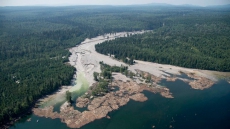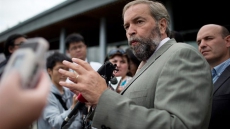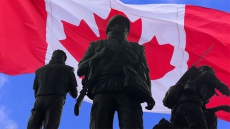TORONTO - The Canada Pension Plan is hiding the fact that its administrative costs have more than tripled since 2006 because of transaction and external management fees, according to a new report from a conservative think-thank.
The Fraser Institute report — released Wednesday — said the total cost of running the CPP jumped to $2 billion in 2012-13, from $600 million in 2006-07.
"Contrary to claims of proponents of an expanded CPP, or a provincial pension plan in Ontario, many of the costs of large, government-managed pension plans like CPP are hidden," the report's co-author, Philip Cross, said in a news release.
"A full examination of all costs shows that CPP is not as low-cost as they want you to believe."
The CPP 2012 annual report put administrative costs at $490 million plus another $586 million to collect contributions and issue cheques, but Cross said that doesn't include another $859 million in consultant and transaction fees.
"For the public to understand the true costs of the Canada Pension Plan, there must be greater transparency and a full accounting of all costs," he said.
However, the CPP Investment Board said all of those extra costs cited in the Fraser report are correct and are included in its annual report, even if they were left out of the annual report from the CPP itself.
According to the CPPIB, the Fraser Institute report blames the board, which invests the funds, for some things that are the responsibility of the CPP, which collects the contributions from employers and workers and sends out the benefit cheques.
"Our disclosure practices span all aspects of CPPIB, its business operations and our performance results," the board said in a statement.
"We seek to inform our stakeholders, for the sake of transparency itself, and to maintain public accountability."
The Broadbent Institute, a left-leaning think-tank founded by former NDP leader Ed Broadbent, said in a blog report Wednesday that the Fraser Institute had confused the cost of operating the Canada Pension Plan and the operating expenses of the CPP Investment Fund.
"The Fraser Institute implies, without any real evidence, that CPP Investment Fund costs are a bad deal for Canadians, yet returns are clearly much higher than the individual retirement savings vehicles that the Institute favours," said the blog.
Ontario's Liberal government announced plans to create a provincial pension plan after the federal government refused to enhance the CPP, saying it would hurt the economy to require increased contributions from companies and employees.
The province said study after study shows Ontarians aren't saving enough for retirement and nearly two-thirds do not have a workplace pension plan.
A statement from Ontario Finance Minister Charles Sousa's office ignored the rising administrative cost concerns raised by the Fraser Institute, and said the provincial retirement savings plan would be modelled on existing pension plans.
"We'll continue to work with Ontario's large and highly regarded pension funds," said Sousa's spokeswoman, Suzie Heath.
"It's vital that we leverage the expertise of Ontario's public sector pension plans with respect to their strong governance and proven investment track record."
Ontario voters supported the idea of a provincial pension plan when they re-elected the Liberals to a majority government in June, added Heath.
"Our plan was endorsed by the people of Ontario and we are following through on this commitment," she said.
The CPP's net assets were valued at $226.8 billion as of June 30, 2014. Employers and workers each contribute 4.95 per cent of the employee's salary to the CPP.
The Fraser Institute is an independent Canadian research organization that studies issues of economics and public policy from a fiscally conservative, libertarian perspective.





